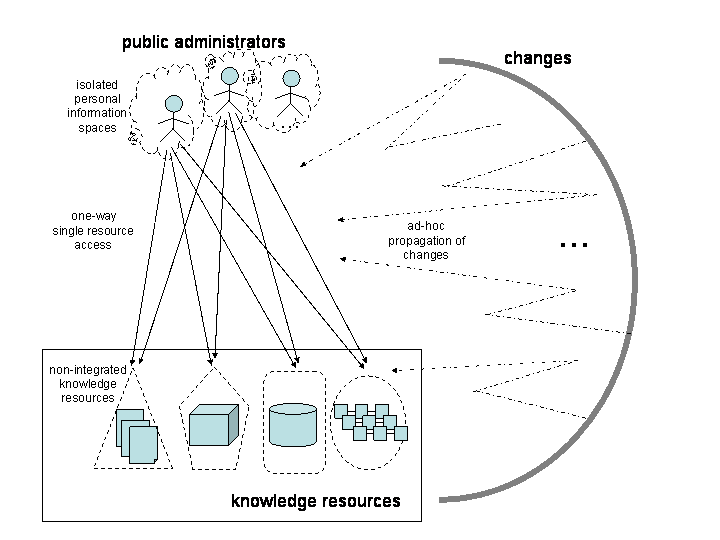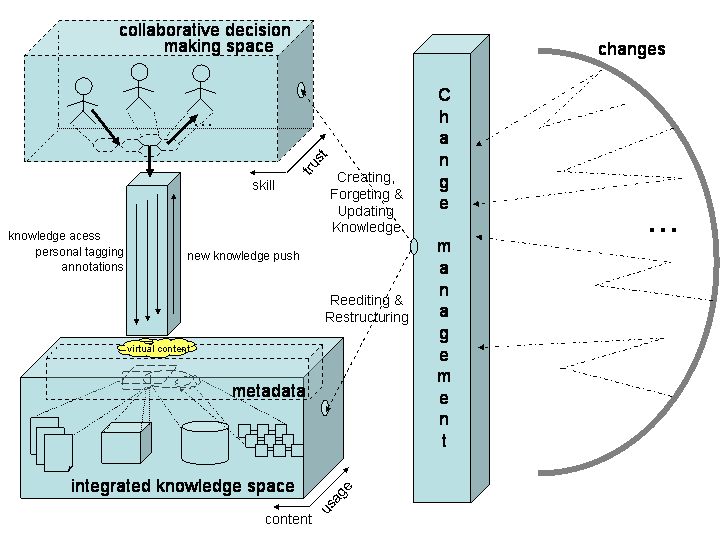March 2006–February 2009

#Project description
Existing approaches for knowledge management in e-government focus mainly on the efficient management of knowledge resources and on supporting communication between public administrators. However, the changes that affect the system are resolved and propagated in an ad-hoc manner, while the demands for knowledge-based e-government are much higher.
- First, the existing approaches do not take into account the increased granularity of informational resources and the manifold semantic differences in dealing with those resources, which is one of the research challenges of the knowledge-enhanced e-government (i.e. “dealing with heterogeneous and fragmented sources of knowledge”).
- Second, due to the complexity of the decision making processes, effective knowledge management requires the creation of a supportive, collaborative culture while eliminating traditional rivalries. Moreover, many administrative processes are collaborative, and since their course is not predetermined, it is often up to the public servant in charge of a process step to determine what should be done next. Other people working on the process should therefore be made aware of the current status and of past actions.
- Third, the usage of existing knowledge resources is indeed a valid aspiration, but for realizing a learning e-government, the crucial question is how to create new knowledge. Since the key to knowledge creation lies in the mobilisation and conversion of tacit knowledge, the focus of the e-government organisational memory should be shifted from explicit to tacit knowledge. It means that written documentation should be enriched with the knowledge that servants have drawn from using the documents and/or replaced by communication among team members.
- Finally, ad hoc management of changes in e-government systems might work in the short term, but to avoid unnecessary complexity and failures in the long run, management must be done in a systematic way. To improve change propagation speed and to reduce modification costs, the knowledge that a public servant uses in making decisions must be efficiently reedited. If the underlying knowledge is not up-to-date, then the reliability, accuracy and effectiveness of the e-government system decrease significantly. Moreover, as the number of administrative services increases, the complexity of change management increases respectively. It is necessary to provide support for propagating changes to all dependent artefacts by ensuring the consistency of the whole system. In other words, a knowledge management approach that enables agile response to frequent and many changes in the environment is needed.

##As-Is situation

##To-Be situation enabled by SAKE
The figures above illustrate the aforementioned problems and show how SAKE will address them.SAKE will provide:
- an integrated knowledge space (instead of a set of isolated and heterogeneous knowledge resources) that will unify different perspectives and interpretations of knowledge resources and will enable their treatment on a far more fine grained level: now any bit of information or any knowledge object could be given identity (so called virtual content) and assigned attributes (metadata) allowing for more sophisticated applications and services in e-government;
- a collaborative working environment (instead of a single person decision making process) that will bring every public servant to the same level of effectiveness and productivity and will ensure more efficient knowledge sharing by guarantee at the same the time the reliability and the consistency of the decision making process;
- *a change management system *(instead of ad-hoc management of changes) that will ensure harmonisation of requests for changes, resolution of changes in a systematic way and their consistent and unified propagation to the collaborative and knowledge space, in order to ensure the high quality of the decision-making process;
- *a platform for proactive delivery of knowledge * (instead of an one-way knowledge access) that enables creation of an adaptable knowledge sharing environment through learning from the collaboration between public servants and their interaction with the knowledge repository and supporting in that way full empowerment of public servants.
##Use of the SAKE System
The SAKE system will be pilot tested by the following Public Administrations:
- The City of Urzad Miasta Czestochowa (Poland)
- The City ward Kosice – district Tahanovce (Slovakia)
- Ministry of Informatics and Communication (Hungary)

